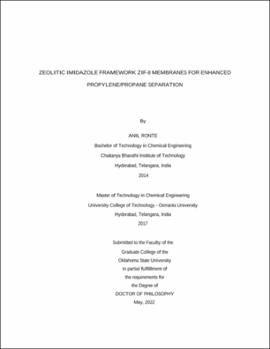| dc.contributor.advisor | Kim, Seokjhin | |
| dc.contributor.author | Ronte, Anil | |
| dc.date.accessioned | 2023-03-31T19:14:57Z | |
| dc.date.available | 2023-03-31T19:14:57Z | |
| dc.date.issued | 2022-05 | |
| dc.identifier.uri | https://hdl.handle.net/11244/337179 | |
| dc.description.abstract | The separation of propylene/propane is essential in the refineries and most importantly, propylene is used as raw material to produce polymers and other intermediate chemicals. The separation of propylene/propane is challenging due to their similar physical properties. Currently, the separation carried out by the conventional distillation process requires a significant amount of operating energy and high capital cost. Therefore, energy-efficient alternative separation techniques are important in the separation processes. Compared to traditional technologies, membrane-based gas separation is a promising alternative substantial candidate for separation processing applications. However, the energy-efficient membrane-based propylene/propane gas separation was not commercialized due to the limited separation capability of current membrane materials. Zeolitic imidazolate frameworks (ZIFs) are a subclass of metal-organic frameworks that are promising membrane materials due to their well-defined ultra-micropores with superior thermal/chemical stabilities. In particular, a prototypical ZIF-8 has shown the potential separation capability of propylene/propane and received massive interest because of its effective aperture pore size of less than 0.5 nm, which is located in between propylene and propane molecular sizes. | |
| dc.description.abstract | However, several challenges hinder their commercial purposes including non-economical ceramic supports, moderate batch process, lack of stability, and general processing methods. Since the microstructure of the membrane is greatly affected by the processing methods, it is important to investigate the optimization of new processing techniques. Moreover, to overcome the challenges in processing methods, a significant improvement is necessary. Therefore, the membrane productivity with separation efficiency can be enhanced by reducing membrane thickness and optimizing the fabrication techniques. | |
| dc.description.abstract | This dissertation proposed novel membrane fabrication methods for superior propylene/propane separation efficiency with high flux ZIF-8 membranes for their practical applications. Three different methods were developed and investigated thoroughly including secondary growth, post-synthetic ZnO atomic layer deposition (ALD), and vapor-phase synthesis of ZIF-8. Moreover, the synthesized membranes were tested for propylene/propane separation measurements to optimize the fabrication techniques and the synthesized membranes were analyzed with a series of characterizations. First, secondary growth membranes were synthesized using silicalite nanoparticles as a seed layer. Using silicalite as seed material made it possible to achieve a high packing density of seed crystal layers in a couple of minutes, followed by 10 h of secondary growth method. It enabled us to obtain high-quality propylene selective ZIF-8 membranes with an average propylene/propane separation factor of ~170. Second, post-synthetic ALD treatment of ZnO on as-synthesized secondary grown ZIF-8 membranes was studied to reduce the surface defects and nonselective diffusion paths. The ALD ZIF-8 membranes stabilized effectively and exhibited a significant increase in separation factor up to ~270. Third, ZIF-8 membranes were prepared without using any solvents. The synthesis method was based on vapor-based technology. Initially, we deposited ZnO on the support surface followed by activation treatment with a ligand which was subsequently converted to a ZIF-8 membrane. The unique vapor-phase method was able to produce an ultra-thin ZIF-8 membrane with a thickness of ~400 nm. The resulting ultra-thin membranes showed significant improvement in propylene/propane membrane separation performance. | |
| dc.format | application/pdf | |
| dc.language | en_US | |
| dc.rights | Copyright is held by the author who has granted the Oklahoma State University Library the non-exclusive right to share this material in its institutional repository. Contact Digital Library Services at lib-dls@okstate.edu or 405-744-9161 for the permission policy on the use, reproduction or distribution of this material. | |
| dc.title | Zeolitic imidazole framework ZIF-8 membranes for enhanced propylene/propane separation | |
| dc.contributor.committeeMember | White, Jeffery L. | |
| dc.contributor.committeeMember | Mcllroy, David N. | |
| dc.contributor.committeeMember | Andiappan, Marimuthu | |
| osu.filename | Ronte_okstate_0664D_17619.pdf | |
| osu.accesstype | Open Access | |
| dc.type.genre | Dissertation | |
| dc.type.material | Text | |
| dc.subject.keywords | atomic layer deposition | |
| dc.subject.keywords | pore-modification | |
| dc.subject.keywords | propylene/propane gas separation | |
| dc.subject.keywords | secondary growth | |
| dc.subject.keywords | silicalite seeding | |
| dc.subject.keywords | ZIF-8 membranes | |
| thesis.degree.discipline | Chemical Engineering | |
| thesis.degree.grantor | Oklahoma State University | |
